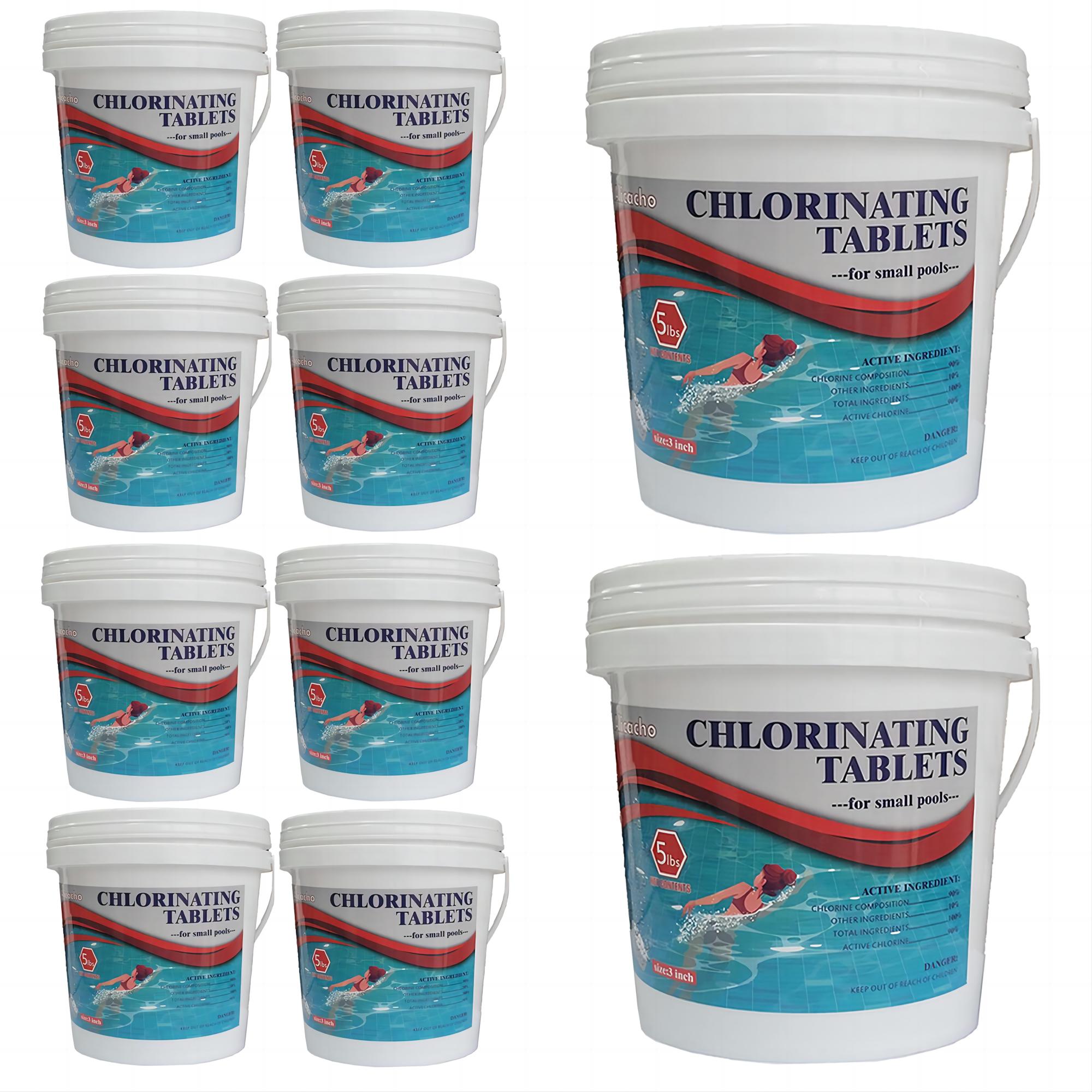There can be confusion to many pool owners if a dilemma in the chlorine level reading is observed, one of the many questions people might ask is, why is my chlorine level not going up? This is one of the most important issues that needs to be addressed immediately. Every pool owner is aware of how important chlorine is when it comes to the welfare and maintenance of the pool.
It might also be confusing especially if measures to add chlorine in pools or increase its levels have been constantly executed or performed. In this article, we will try to answer the question, why is my chlorine level not going up, and cite some solutions that pool owners can try to fix the dilemma.
Part 1. Why is My Chlorine Level Not Going Up?
If you have come to a conclusion and get no reading for the chlorine levels in your pool, you might be wondering why. If the pool water is tested and there is no chlorine level reading, it can be caused by a very high demand for chlorine. When there is an inability to keep enough level of chlorine in your pool even if you have executed measures to balance and maintain your pool water, it means that there is high chlorine demand.
It is a condition when the oxidation levels increase and reach a point where chlorine is being used faster than it can be applied to your pool water by the process of shocking or usual applications using salt chlorinator. This scenario can be caused by low levels of chlorine stabilizers in the pool, low levels of pH, or there could be possible contamination as well. You can also easily see the indication if your pool is a bit hazy or cloudy, and you have a very slimy pool wall.

Part 2. What Causes High Chlorine Demand In Pools?
To answer a common question, why is my chlorine level not going up, we have gathered possible reasons for high chlorine demand. As we have discussed, when there is a high chlorine demand, this means that there are important chlorine stabilizer levels that are not kept to the required level. High chlorine demand is also called chlorine lock, so if you have heard the same terminology, it only means the same thing. So, why is my chlorine level not going up, or what causes chlorine to lock in pools?
1. Chemical Levels in Your Pool are Not Balanced.
One of the most important factors to keep a healthy pool is to make sure that there is chemical balance. It is important to pay attention to the level of your pool chemicals and make sure that they are still in the required or needed ranges. You have to use testing strips and go measure chemical levels twice or once a week depending on how heavy your pool is utilized.
One of the examples that perfectly shows chemical imbalances is when there is too much CYA or cyanuric acid in your pool, if this chemical’s level is too high, it will create a high chlorine demand. You have to make sure that you add the right level as it is not also good if the readings of CYA are low, it can cause earlier depletion of chlorine, CYA protects your pool from the harmful rays of the sun especially if your pool is not located in shaded or outdoor areas.
2. Too Many Organic Contaminants that Can be Found in Your Pool.
Another major cause of having high chlorine demand is when there are too many phosphates or algae. Even if you are continuously adding enough chlorine to your pool water, these organic contaminants like algae will likely consume it faster than you have ever thought. Your pool is always exposed to different organic materials that may cause chlorine lock, some of which are urine from bathers, lotions, shampoos, detergents, sunscreens, twigs, branches of trees, dried leaves, algae, and a lot more. To fight over these organic contaminants, chlorine is needed, and when there are too many organic contaminants in pools, this also means faster chlorine depletion.
3. There has Been Excessive Rain or a Huge Storm.
Aside from having lots of organic contaminants which are often introduced by bathers, it is also possible that chlorine lock is caused by excessive rains or huge storms. This is most likely to happen if you have an uncovered and unattended pool. Once it starts raining, air pockets are formed in the raindrops which allows oxygen into the water, once this happens, there could be huge effects on the pool chemistry resulting in chlorine lock.
To determine if there is a chlorine lock in your pools, you need to immediately get a test strip and check the chlorine levels, you need to test for the free chlorine and the total chlorine levels. You have to remember that once the level of your free chlorine matches that of your total chlorine reading, it is a normal reading and there is indication of chlorine lock. However, once the free chlorine reading is different from your total chlorine reading, there is a problem that you have to immediately. To fix the dilemma right away, we have also shared solutions to chlorine lock in the next part of the article.
Part 3. How Can You Fix Chlorine Demand?
Now that we have finally answered the question, why is my chlorine level not going up, it is time to go and figure out the solutions that we can do to be able to address it the soon time possible. These are just some of the solutions any pool owner can try executing to address the chlorine loss as soon as possible.
1. Shock your pool.
One of the easiest solutions that you can do is to shock your pool. This is a process where you need to bring your chlorine level to 20 ppm or three times higher than what your current level of chlorine is. It is recommended that you use a non-chlorine oxidizing shock until you can observe that the level of the free chlorine and total chlorine is already the same. It is best advised to perform pool shocking at night to avoid sunlight that may disrupt the good effects of shocking by accumulating the chlorine in pools.

2. Use clarifiers.
Another thing that you can do is to apply a clarifier, they will help your pool water to be clear and keep it that way. It can help remove contaminants that are microscopic through the pool’s filtration system, and this will also help you maintain a great chlorine level.
3. Apply a chlorine stabilizer.
You have to put chlorine stabilizers in your pool like CYA or cyanuric acid. It is a chemical used for pool balancing which can help your chlorine last longer. Chlorine is unstabilized in form and can be easily degraded when exposed to too much sunlight. If you add CYA or any chlorine stabilizer to your pools, you can be assured that the sun will not have that much impact on your chlorine levels. The level of chlorine stabilizer must be maintained between the range of 30 and 150 ppm. It is advised to make sure that chlorine levels will stay at the required level for a longer time so it is available to sanitize the pool water and kill contaminants present in the pool as well.
4. Make Sure the Chemicals in your Pool are Balanced.
One of the important things to remember is to keep all your chemicals at the required ranges. This will help you maintain the pool, and make it beautifully running with lesser or even no dilemmas at all. To serve as your guide in balancing your pool chemicals, these are the ranges that you have to take note of:
- Chlorine or Free Chlorine- the ideal level is 3 ppm
- Total Dissolved Solids- it must be maintained at less than 2,000 ppm
- Calcium Hardness- the ideal range is between 200 and 400 ppm
- Total Alkalinity- the ideal range must be between 80 and 120 ppm.
- pH- the ideal range of pH is between 7.4 and 7.6
These are only a few of the solutions that you can try to avoid and fix chlorine lock or loss of chlorine. Once you have tried everything, and the issue persists, you can try executing the said fixes one after the other, or try to look for other possible solutions on the web.
Part 4. To Summarize It All
Owning a pool means having a responsibility that you have to bear as long as you own one. It may be too hard at first, but as long as the dedication and the drive to learn are present, it can also be as enjoyable as dipping in your pool during summer or whenever you like!



